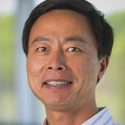Team receives $1.25 million grant for stem cell research
A multidisciplinary team led by James Thomson has received a $1.25 million grant for stem cell research from the W.M. Keck Foundation of Los Angeles.
The grant is directed to a three-year project focusing on the nature of embryonic stem cell “pluripotency,” the capacity of the cells to proliferate in an undifferentiated state indefinitely while retaining the ability to develop into any of the cell types in the human body.
The grant will help create an infrastructure that will broadly support genetic analysis and research on human embryonic stem cell differentiation. In 1998, Thomson earned worldwide recognition for deriving and cultivating the first sustained undifferentiated human embryonic stem cells. UW–Madison, through Thomson’s work, possesses five of the embryonic stem cell lines approved for federal funding, and those cell lines will be used in the project. In addition, the maskless DNA array synthesizer, invented at UW–Madison, will manufacture the gene chips used to explore the complex molecular phenomena involved in the study.
“Inadequate federal funding for human embryonic stem cell research gives private funding in this area an exceptionally high impact, and we are very grateful for the investment that Keck is making here,” Thomson says. “This Keck funding will allow us to combine two UW innovations, human embryonic stem cells and the Maskless Array Synthesizer, to give us fundamental new insights into the human body. This grant unites expertise in engineering, bioinformatics and stem cell biology in a way that is unprecedented, and it provides a glimpse of the future of biological research.”
“This type of interdisciplinary, collaborative approach to research is not only a hallmark at our university, but holds the greatest promise for advancement in the stem cell arena,” says Chancellor John D. Wiley.
Those undertaking the study seek to show how determining the biological mechanisms involved in embryonic stem cell pluripotency will make it possible to understand how to reprogram adult stem cells to a pluripotent state.
The reversibility of the differentiated state in adult stem cells represents a true paradigm shift for developmental biologists. It was previously thought that differentiated adult stem cells could not go “backwards.” Reprogrammed adult cells could be used to generate, for instance, tissues for transplantation genetically matched for an individual and thus not rejected by the immune system.
Such a breakthrough would have ramifications for a wealth of medical applications.
Key members of the team, in addition to Thomson, are Francesco Cerrina, director of the Center for Nanotechnology and professor in the College of Engineering; Michael R. Sussman, director of the Biotechnology Center and professor in the College of Agricultural and Life Sciences (CALS); and Audrey Gasch, assistant professor of medical genetics in the Medical School and genetics in CALS.
Based in Los Angeles, the W.M. Keck Foundation was established in 1954 by the late W.M. Keck, founder of the Superior Oil Company. The foundation’s grant making is focused primarily on pioneering efforts in the areas of medical research, science and engineering. The foundation also maintains a Southern California Grant Program that provides support in the areas of civic and community services with a special emphasis on children. For more information, visit the Keck Foundation’s Web site.
Tags: research, stem cells

